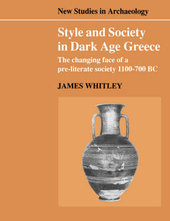
|
Style and Society in Dark Age Greece: The Changing Face of a Pre-literate Society 1100-700 BC
Paperback / softback
Main Details
| Title |
Style and Society in Dark Age Greece: The Changing Face of a Pre-literate Society 1100-700 BC
|
| Authors and Contributors |
By (author) James Whitley
|
| Series | New Studies in Archaeology |
|---|
| Physical Properties |
| Format:Paperback / softback | | Pages:272 | | Dimensions(mm): Height 246,Width 189 |
|
| Category/Genre | World history - BCE to c 500 CE
Classical Greek and Roman archaeology |
|---|
| ISBN/Barcode |
9780521545853
|
| Classifications | Dewey:938.501 |
|---|
| Audience | | Professional & Vocational | | Tertiary Education (US: College) | |
|---|
| Illustrations |
14 Tables, unspecified; 39 Plates, color; 21 Line drawings, unspecified
|
|
Publishing Details |
| Publisher |
Cambridge University Press
|
| Imprint |
Cambridge University Press
|
| Publication Date |
4 December 2003 |
| Publication Country |
United Kingdom
|
Description
In this innovative study, James Whitley examines the relationship between the development of pot style and social changes in the Dark Age of Greece (1100-700 BC). He focuses on Athens where the Protogeometric and Geometric styles first appeared. He considers pot shape and painted decoration primarily in relation to the other relevant features - metal artefacts, grave architecture, funerary rites, and the age and sex of the deceased - and also takes into account different contexts in which these shapes and decorations appear. A computer analysis of grave assemblages supports his view that pot style is an integral part of the collective representations of Early Athenian society. It is a lens through which we can focus on the changing social circumstances of Dark Age Greece. Dr Whitley's approach to the study of style challenges many of the assumptions which have underpinned more traditional studies of Early Greek art.
Reviews'...a convincing plea for an archaeological treatment of Geometric pottery which neither reduces it to ideology nor relegates it to 'connoisseurship' and the values of the art market.' Antiquity
|